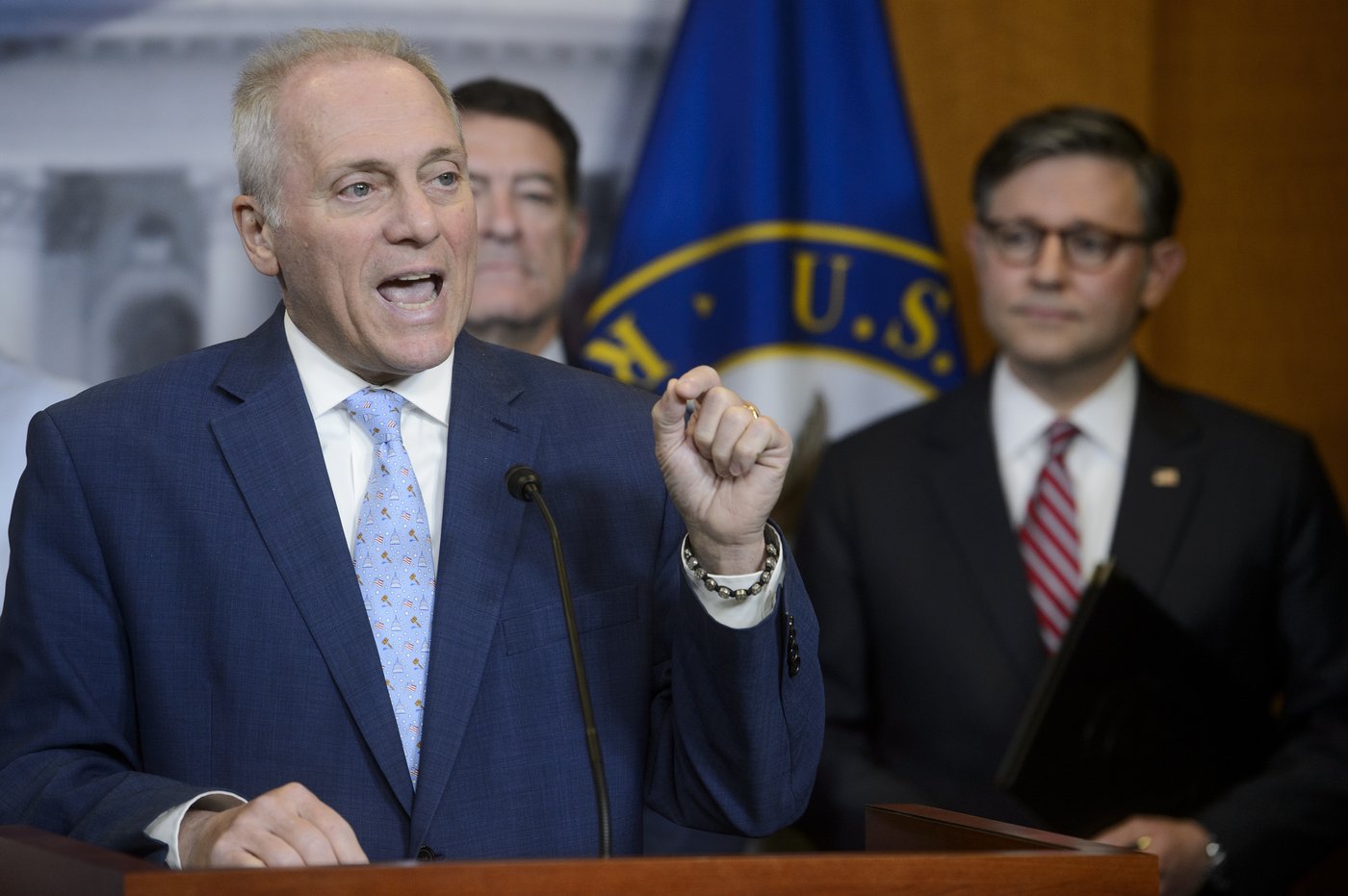House Republicans Approve Trump’s Sweeping Tax Breaks and Program Cuts After Marathon All-Night Session
WASHINGTON (AP) — The House Republicans worked through the entire night to approve their
multitrillion-dollar tax breaks package
, with
Speaker Mike Johnson
challenging the doubters and bringing together his followers to gain strength
President Donald Trump’s
Priority bill for approval set for Thursday.
With
last-minute concessions
And with strong warnings from Trump, most of the remaining Republicans abandoned their objections to save the legislation.
“One Big Beautiful Bill”
that’s central to the GOP agenda. The House launched debate before midnight and by dawn the vote was called, 215-214, with Democrats staunchly opposed. It next goes to the Senate, with long negotiations ahead.

“To put it succinctly, this bill will help get Americans back to achieving success once more,” he stated.
Johnson, R-La
.
The result concludes a period of intense activity on Capitol Hill, marked by continuous rounds of private talks and public committee hearings held day and night. Republicans maintained that their extensive bill spanning over 1,000 pages represented what constituents expected from them in Congress—and from Trump to secure his presidency. They view it as “rocket fuel,” as one member stated during discussions, aimed at boosting economic growth.
uneasy U.S. economy
.

Trump himself
demanded action
, met with Republican representatives from the House during their conference meeting on Tuesday and hosted GOP leaders along with the undecided members for an extended session at the White House on Wednesday. Prior to the vote, the administration issued a warning in a statement.
pointed statement
That failure would constitute the ultimate betrayal.
Following the bill’s approval, Trump shared on social media: “A big thank you to all Republicans who supported this Historical Bill! It’s now up to our colleagues in the U.S. Senate to take action.”
The Senate aims to complete its version by the Fourth of July holiday.
At the heart of the proposal lies the Republican Party’s pledge to extend approximately $4.5 trillion worth of tax cuts that were implemented under President Donald Trump’s initial term in 2017. Additionally, the plan includes temporary extensions for several new tax breaks proposed during Trump’s 2024 presidential campaign.
no taxes on tips
, premium pay for extra hours, interest on auto loans, and additional expenses.
In an effort to compensate for some of the lost tax income, the Republicans concentrated on modifications.
to Medicaid
and the food stamp program, primarily through implementing
work requirements
On numerous individuals receiving benefits. Additionally, there’s an enormous
reversal of tax incentives for green energy
From the Inflation Reduction Act of the Biden era.
Furthermore, the package adds an additional $350 billion in new expenditures, with roughly $150 billion allocated to the Department of Defense, which includes funding for the President’s new “
Golden Dome” defense shield
, and the remainder for Trump’s
mass deportation
and border security agenda.
In total, according to the nonpartisan Congressional Budget Office, approximately 8.6 million fewer individuals would retain healthcare coverage, and about 3 million fewer people would receive monthly Supplemental Nutrition Assistance Program (SNAP) benefits under the suggested modifications.
The CBO stated that the tax measures would lead to an additional $3.8 trillion in federal deficits over ten years, while the
changes to Medicaid
, food stamps and other benefits could lead to decreased spending totaling $1 trillion. This reduction would result in lower resources for low-income families in the U.S., whereas high-income households would experience an increase, according to the report.
House
Democratic leader Hakeem Jeffries
Of New York read letters from Americans detailing how the program reductions would adversely affect them. “This is quite an extensive and unpleasant piece of legislation,” he commented.
As the minority lacking sufficient votes to block Trump’s legislation, Democrats resorted to delivering fervent speeches and employing parliamentary tactics aimed at delaying its progression. The moment the House floor resumed for discussion, Democrats initiated a motion to adjourn, which did not succeed.
“In the dead of night, they aim to push through this Republican tax bill,” stated Rep. Pete Aguilar, D-Calif.
Other Democrats referred to it as a “large, problematic legislation” or a “major, unfulfilled pledge.”
Meeting his Memorial Day deadline has proven to be a significant political challenge for Johnson, as he operates with minimal wiggle room due to his narrow Republican majority. The party members themselves have differing agendas, making consensus difficult to achieve.
The Conservatives, especially those from the House Freedom Caucus, insisted on deeper spending reductions to offset the accumulating expenses.
nation’s $36 trillion debt
.
Meanwhile, several moderate and center-leaning Republican legislators expressed concerns about potential alterations to Medicaid that might lead to their constituents losing healthcare coverage. Additionally, some feared that phasing out the tax incentives for renewable energy would hinder businesses from investing in environmentally friendly initiatives across various states.
A significant issue has been the expensive agreement with GOP legislators from New York and other high-tax states to increase the $10,000 deduction for state and local taxes, known as SALT, fourfold to $40,000 for incomes up to $500,000, which made it into the final version.
With each group Johnson aimed to please, another would voice fierce objections.
Towards midnight, Republican Party leadership revealed a new plan.
42-page amendment
with several amendments.
The modifications encompassed quicker enforcement of the Medicaid work mandates, set to start in December 2026 instead of January 2029, along with an accelerated phase-out of the production tax incentives for renewable energy initiatives—both measures favored by conservative groups.
Also included in the finalized version were several unforeseen additions, such as a $12 billion fund designated for the Department of Homeland Security. This fund aims to compensate states that assist federal authorities with deportation efforts and border security.
In recognition of Trump’s impact, the Republicans decided to rename a suggested new children’s savings initiative after the president. They changed it from MAGA accounts—short for Money Accounts for Growth and Advancement—to just “Trump” accounts.
Representative Erin Houchin, R-Ind., stated that Americans should not heed the grim forecasts presented by Democrats regarding the effects of the legislation. “We have the potential to usher in the ‘Golden Era’ of America,” she asserted, mirroring the President’s sentiments.
Early in the morning, the remaining dissenters seemed to align themselves with the rest. Representative Ralph Norman from South Carolina stated that they “secured some enhancements.”
However, two Republicans opposed the package, with Rep. Thomas Massie from Kentucky being one of them. Known as a fiscal hawk who has faced public criticism from Trump, Massie stayed firm. “This legislation acts like a debt time bomb,” he cautioned.
And Representative Andy Harris, the chairperson of the Freedom Caucus who desired additional time, cast his vote as present. Other individuals chose not to vote.
The comprehensive evaluation of the total expenses and economic effects from the entire package is currently ongoing.
In addition to prolonging current tax incentives, this plan would raise the basic income tax exemption to $32,000 for couples filing jointly, and elevate the child tax credit to $2,500. It also introduces a reinforced deduction of $4,000 for senior citizens within specified income brackets, aimed at mitigating taxes levied on Social Security benefits.
In order to reduce expenses, individuals eligible for Medicaid who are working-age adults without children must participate in at least 80 hours per month of employment or engage in other community-oriented activities.
Likewise, to qualify for food stamps via SNAP, individuals aged up to 64—instead of 54—who are fit to work and do not have dependents must adhere to the requirement of completing at least 80 hours per month of employment or community involvement activities. Furthermore, certain parents whose children are over 7 years old will also be required to meet these work obligations.
Republicans stated their intention to eliminate waste, fraud, and misuse within the federal initiatives.
___
Matt Brown and Joey Cappelletti from the Associated Press contributed to this report.
Leah Askarinam, Kevin Freking, Lisa Mascaro, and The Associated Press